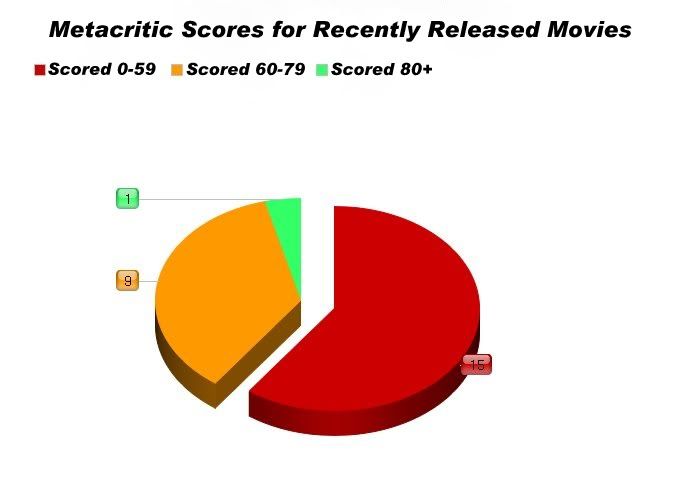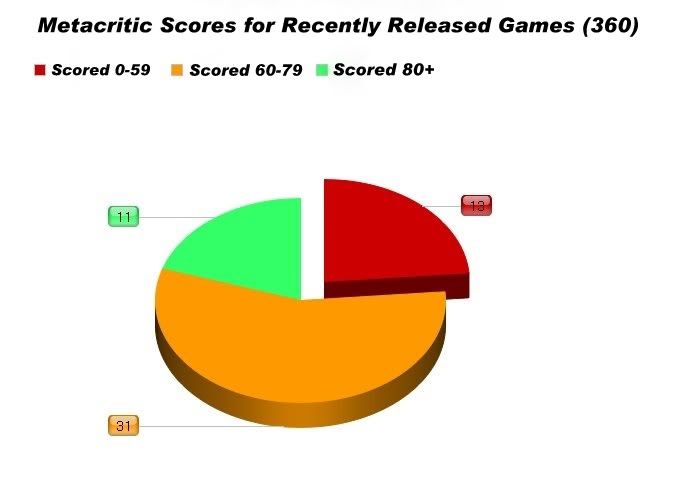Are We Overscoring Blockbuster Video Games?
- By Dan Crawley
- Updated: 6th Sep, 2011
When trying to decide where they should spend their hard earned cash, where else would a video game consumer look for guidance, than the scores handed out by the gaming press? But when all the blockbuster titles are picking up near identical 8/10 or 9/10 scores, how is anyone supposed to differentiate between them?
Let’s take a look at the top selling games and movies from 2010, to see how these massive earning, blockbuster titles were dealt with respectively by the game and movie press.
Top Grossing Movies 2010 – US
| MOVIE | METACRITIC RATING |
| Toy Story 3 | 92 |
| Alice in Wonderland | 53 |
| Iron Man 2 | 57 |
| The Twilight Saga: Eclipse | 58 |
| Harry Potter Deathly Hallows Pt 1 | 65 |
| Inception | 74 |
| Despicable Me | 72 |
| Shrek Forever After | 58 |
| How To Train Your Dragon | 74 |
| Tangled | 71 |
Source: Box Office Mojo
Top Grossing Games 2010 – NPD US figures
| GAME | METACRITIC RATING |
| Call of Duty: Black Ops | 87 |
| Madden NFL 11 | 84 |
| Halo: Reach | 91 |
| New Super Mario Bros Wii | 87 |
| Red Dead Redemption | 95 |
| Wii Fit Plus | 80 |
| Just Dance 2 | 74 |
| Call of Duty: MW2 | 94 |
| Assassin’s Creed: Brotherhood | 90 |
| NBA 2K11 | 89 |
Source: Gameasutra (for multiplatform games, the top scoring edition was used)
The reviews and subsequent Metacritic scores awarded to most of the Top Ten films are fairly decent, but not great. In fact, four of the Top Ten received scores in the 50-60 range. Yet despite these scores, the films were all a resounding box office success in 2010. In light of that, should these sub-60 scores be seen as ‘bad’ for a blockbuster movie? Probably not.
Compare that to the scores awarded in the Gaming Top Ten of 2010. Only one of those blockbuster games titles came in with a score of less than 80, and 4 of them scored 90 or more.Wow, those must be some games… right? Surely they aren’t just sequels to established franchises, featuring near identical gameplay to last year’s editions? Well, OK, maybe a couple of them are. Fair enough.
But the other games on the list must surely be comparable to some of the masterpieces of modern cinema, given their exceptional ratings? Well, not necessarily.*
Modern Warfare 2 is a prime example. Sure, the single player campaign was pretty spectacular, with bodies flying everywhere and a snowmobile chase, but did anyone really keep up with the frankly ludicrous and confusing storyline? Looking at its Metacritic rating of 94, is this game really deserving of more praise than such classic war movies as Apocalypse Now (Metacritic Score: 90), Full Metal Jacket (78), or The Deer Hunter (73)?
Red Dead Redemption (95) was undoubtedly one of the best games of 2010. It is a brilliant and evocative take on the Western genre, but boy was it long and pretty darn repetitive at times. Surely its cultural significance is not greater than the Oscar winning Unforgiven (82), in which Clint Eastwood reinvented the fading Western genre for a new generation of film goers.
Just Dance 2 (74) has fantastic mass market appeal, and is a great cross generational casual gaming title, but is it really that much more of an achievement than the Patrick Swayze starring, all singing and dancing ‘offically-all-time-most-popular-chickflick’ Dirty Dancing (66)? Or even Flashdance (35)?
In giving out scores to these blockbuster games, should we not be saving the exceptionally high ratings for truly original, thoughtful, innovative and creative titles? By readily handing out over the top scores for blockbuster titles, which sometimes flatter to deceive, are we not devaluing the concept of the scoring system? If every AAA title that gets released receives a 9/10, what scope is there for improvement, and where does it leave the rest of the gaming industry, the part that isn’t working with marketing budgets greater than the GDP of many small countries?In addition to this tendency towards awarding high scores too readily, there seems to also be a trend in game reviewing for over scoring mediocre games – illustrated well by the achievements of the slightly-less-than-classic Mafia II.
Sitting outside the top 10 for 2010, Mafia II came in with a comfortable Metacritic score of 77 (PC), easily outscoring the Puzo-penned, Coppolla-directed movie The Godfather Part II. Coppola’s cinematic classic limps in with a paltry 71 in comparison. Without really wishing to offend any section of the Mafia, I would have to stick my neck on the line and say that, in a Mafia war, Pacino’s crew would get the nod from me.
Looking at this summer’s movie and game releases, it seems apparent that the game scores being handed out are far more generous than those given to movies, particularly in terms of the middle ground. Three quarters of the games released on Xbox 360 this Summer have garnered Metacritic scores of 60 or more. In comparison, only just over a third of movie releases have managed the same.


What can this mean? Was this round of summer video game releases really that superior to their movie equivalents? Or is this more indicative of a scoring pattern that has shifted inexorably towards the top end of the scale, where video games are concerned?
Far too many games seem to be awarded comfortable scores of 6, 7 or even 8 in the gaming press without really deserving it. There are a number of games currently sitting in that 6-8 comfort zone that I have tried, and would frankly not encourage anyone to waste their time playing. By the same token, there are some absolute gems that have been lumped into that same 6-8 scoring band, which may have been missed by a large proportion of the gaming public. Is it not time for a bit more maturity and self reflection in the use of scoring systems, so that the products being reviewed are more accurately described, and we actually start discriminating properly between what we feel are good and bad games?
I know that the gaming industry is still very much in its infancy, and is really only just being accepted as part of mainstream media culture, but don’t we owe it to ourselves, and to the industry as a whole, to be slightly more honest about the quality of product that is being produced? There is still going to be a market for low scoring games, and we don’t have to kid ourselves that every blockbuster gaming title produced is going to be an instant classic. By regularly over scoring these blockbuster titles, are we not denying coverage to some of the more interesting games that tend to get overlooked, and fall far too quickly into the ‘bargain bins’, or sit gathering virtual dust on the digital shelves of the Xbox Live and PSN stores?
Scores out of 10 for this article are welcome below. They will possibly be sorted and presented in the form of a pie chart at some point.
*Disclaimer: I do realise that it is slightly facetious to directly compare movies and games, but I am doing so to make a point. Thank you.
4 Comments
About Dan Crawley
Dan is 35-ish years old, and started gaming in 1982 on a beautiful, but stubborn, ZX81. He enjoys playing classic Nintendo platformers, first-person shooters and some of the more innovative PSN and WiiWare titles. His two favourite games from the last ten years have been Ico and Valkyria Chronicles.



Pingback: Review Scores | Fear And Loathing And Cultural Worth | Video Game Deals & UK News | Dealspwn.com